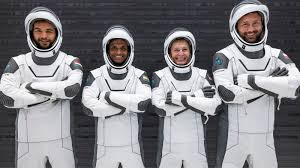Axiom-4, piloted by Shubhanshu Shukla, delayed; launch June 11

India is poised to achieve a major breakthrough in human spaceflight. Group Captain Shubhanshu Shukla of the Indian Air Force is all set to travel to the International Space Station (ISS) aboard the Axiom-4 mission. Initially scheduled for June 10, the launch has been rescheduled to June 11 due to adverse weather conditions at NASA’s Kennedy Space Center in Florida.
Who Is Shubhanshu Shukla?
Group Captain Shukla is not just any pilot. He is a seasoned officer of the Indian Air Force with vast experience in operating fighter jets. Moreover, he has undergone extensive astronaut training under ISRO, NASA, and Axiom Space. As a result of this intensive preparation, he is ready to make history as the first Indian astronaut to visit the ISS.
What Is the Axiom-4 Mission?
The Axiom-4 mission (Ax-4) is part of a private space initiative operated by Axiom Space in partnership with SpaceX. The mission will be launched using a Falcon 9 rocket, carrying the astronauts inside a SpaceX Crew Dragon spacecraft. The crew includes astronauts from India, the USA, Poland, and Hungary, showcasing the increasing global nature of space travel.
Axiom-4 Crew Line-up:
- Peggy Whitson (USA) – Commander and veteran NASA astronaut
- Shubhanshu Shukla (India) – Pilot
- Sławosz Uznański (Poland) – Mission Specialist
- Tibor Kapu (Hungary) – Mission Specialist
Together, this multinational crew will stay on the ISS for approximately 14 days, conducting a wide range of scientific and technological experiments.
Why Was the Launch Delayed?
Originally set for June 10, the mission faced a short delay due to bad weather. Thunderstorms and strong upper-level winds forced NASA and SpaceX to postpone the launch. Ensuring the safety of the crew is the highest priority, especially during launch and re-entry.
The new launch time is scheduled for June 11 at 5:30 PM IST, assuming weather conditions improve. Delays like this are common in space missions and are taken as a necessary precaution.
India’s Science Goals in Space
Shubhanshu Shukla will not just be a passenger. He will actively conduct a variety of microgravity experiments designed by Indian research institutions. These experiments align closely with India’s future Gaganyaan mission, which will be the country’s first manned spaceflight mission under ISRO.
Key Experiments Include:
- Seed Germination in Microgravity: To understand how crops like moong and methi grow in space conditions.
- Cognitive and Physiological Tests: These will analyze the effects of space travel on human memory, attention, and body health.
- Microbial Studies: To observe how common microbes behave in zero gravity, which is vital for future long-duration missions.
These research projects are a collaboration between ISRO, the Department of Biotechnology, and NASA, marking a significant step for Indian science on the global stage.
A Crucial Step Toward Gaganyaan
This mission is more than symbolic. It provides crucial data for India’s upcoming Gaganyaan program, set to launch by 2027. The knowledge gained from Shukla’s time aboard the ISS will help in finalizing astronaut training, health systems, and on-board equipment for future Indian missions.
Additionally, the experiments will allow Indian researchers to compare data between space and Earth, helping them fine-tune life-support systems and medical responses for astronauts.
Rising Global Cooperation in Space
The Axiom-4 mission is also a strong example of how commercial space companies are transforming international space collaboration. Through Axiom’s efforts, astronauts from countries without their own launch vehicles—like India, Poland, and Hungary—can still participate in human spaceflight.
This shift opens new doors for scientific diplomacy, joint research, and shared technological development between nations. For India, it signifies a chance to lead not just in science, but also in cooperation.
What This Means for India
The inclusion of Shubhanshu Shukla in Axiom-4 reflects how far India’s space journey has come. It has moved from launching satellites to sending a human into space via international collaboration. Furthermore, it sends a clear signal to the world: India is ready for the next phase of space leadership.
Indian students, scientists, and space enthusiasts are following this mission closely. It serves as both inspiration and proof that India can compete and collaborate at the highest levels in space exploration.
Final Countdown to Launch
With only hours to go until the June 11 launch, the excitement is rising. The mission may have been delayed by weather, but its importance remains unaffected. Shukla’s flight to the ISS is more than just a scientific trip; it’s a symbol of national pride, scientific ambition, and international cooperation.
This journey will not only add to India’s scientific knowledge but will also inspire the next generation of space explorers.






